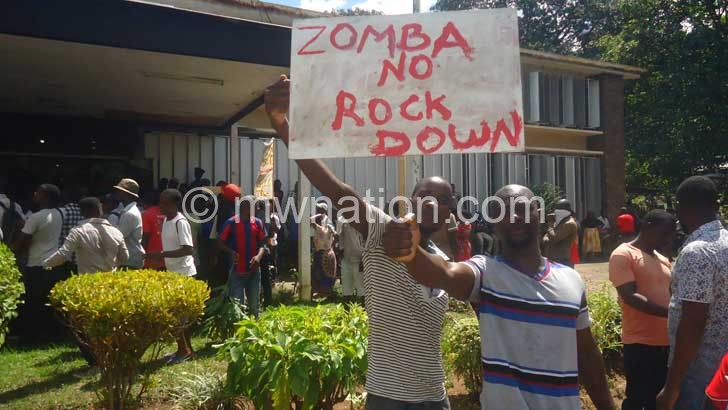Doctors dismiss lockdown
The Society of Medical Doctors (SMD) has told the High Court of Malawi that coronavirus prevention measures such as lockdown are not appropriate because they could impinge on people’s livelihood on access to food and health care.
The doctors have made the submission following a High Court request for their expert opinion or evidence in the case in which the Minister of Health declaration of the lockdown in April was challenged through a judicial review process that was then certified as a constitutional matter.
In their submission to the court dated July 20 2020, the medical doctors, with specific reference to lockdown, acknowledged the potential utility of such a measure to curb the spread of the severe acute respiratory syndrome coronavirus, but cast doubt on effective implementation of the measure.
Reads the submission in part: “Furthermore, without a clear understanding of where we are at with respect to the basic or effective reproductive number for the corona at the start of any intervention, it will be unknown whether the measures are effective or not.

“This leads to our conclusion that the basic ingredient for the lockdown was absent, thus putting in question the measure. Finally, we are of the opinion that under the appropriate epidemiologic context and distress mitigation measures, a lockdown may be implemented in Malawi.”
The doctors said they were hesitant to propose that a strict lockdown would be in the interest of overall public health in this country largely because while it may be responsible for reducing the spread of the virus, the potential for significant harm was real.
The society said the severe form of Covid-19 disease was claiming the lives of many economically and socially productive adults.
They said: “As such, there has been a diverse impact on the social structure, economy and health status of nations. Nations have adopted World Health Organisation [WHO] recommended prevention strategies and implemented them to suit their local context to mitigate these pandemic effects.
“The WHO has developed strategic approaches for the pandemic from which countries are expected to contextualise their own feasible approach.”
The national responses, they said, have, therefore, been different with some prioritising lockdown and others combining lockdown and the strengthening of the health system.
“Countries have invested in procuring and/or manufacturing personal protective equipment (PPE) and medical equipment, expediting the recruitment of their human resource in health to ensure that their hospitals meet the service demand of illnesses,” the doctors observe.
The court also asked Malawi Law Society (MLS) and Women Lawyers Association to make their submissions as friends of the court.
Some individuals and Human Rights Defenders Coalition (HRDC) sought the court’s relief and an injunction was issued before the Democratic Progressive Party (DPP) administration was ousted from power in the June 23 2020 fresh presidential election.
But the Tonse Alliance administration of Lazarus Chakwera, now made first respondent in the case as President of Malawi, on July 10 issued yet another set of Covid-19 restrictions through Ministry of Health, almost similar to those the initial injunction had stopped.
The development prompted new Attorney General (AG) Chikosa Silungwe to write co-chairperson of the Presidential Task Force on Coronavirus Dr John Phuka to stop enforcement of the new restrictions because there was a standing injunction against the same.
As of July 19 2020, Malawi had registered 2 992 confirmed cases (with 85 new cases on that day) and 62 deaths, the doctors explained, adding that there were 2 089 (70 percent) locally transmitted cases and 903 (30 percent) imported cases with 1 713 active cases.
Thus far, they note, 23 733 sample testing had been conducted in the 40 laboratories spanning across the country, according to data they obtained from the Public Health Institute of Malawi (PHIM) report, meaning there is a sharp increase of infections.
Covid-19 projections for Malawi, they observe, have not reflected the real-life situation being experienced as a nation.
The medical doctors say Ministry of Health’s Kuunika Team projected that without interventions, Malawi would register as many as 16 million infections and 50 000 Covid-19 deaths.
The concerned citizens, that included bottle store owners and HRDC, challenged restrictions the immediate past president Peter Mutharika issued in the face of the global Covid-19 pandemic.
Phuka had announced the Covid-19 measures included a ban on meetings, street markets, weddings, and restrictions on bars and other entertainment places, capacity in passenger vehicles but also adherence to all Covid-19 measures in religious gatherings and funerals, which were to be enforced by local councils and relevant law enforcement agencies.





